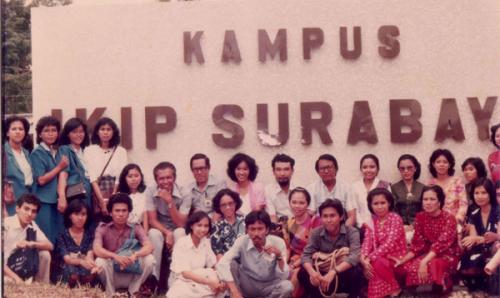History

The history of Universitas Negeri Surabaya is related to the Institute of Teacher Training and Education Surabaya (Indonesian: Institute Keguruan dan Ilmu Pendidikan IKIP) which was founded around 1950. Earlier, it was begun from B-I and B-II courses majoring in Chemical Sciences and Exact Sciences to ensure the availability of junior and senior high school. It used classrooms and laboratories belonging to the Dutch Hogere burgerschool (HBS). Its courses were (a) B-I and B-II Chemistry, (b) BI and BII Mathematics (exact science), (c) BI English, (d) BI German, (e) BI Engineering, (f) BI Physical Education, (g) BI Economics, (h) BI Commerce, and (i) BI Aircraft Science. From 1957 to 1960, the B-I courses had been grouped into: (1) General B-I Course, covering English and German, and (2) Vocational B-I Course, covering Chemistry, Science, Economics, Commerce, Engineering, Education, Physics, and Aircraft Science. These courses lasted until 1960.
To eliminate the dualism of B-I and B-II courses graduates degrees, in 1960, the B-I and B-II courses were integrated into Faculty of Education and Teacher Training (Indonesian: Fakultas Keguruan dan Ilmu Pendidikan or FKIP) to graduate advanced school teachers through the MPRS Decree No. 11/MPRS/1960. In addition, by the Decree of the Minister of Education and Culture number 6/1961 on February 7, 1961, FKIP Surabaya was absorbed into FKIP Universitas Airlangga of Surabaya branch.
In 1962, with the establishment of the Teacher Education Academy (Indonesian: Akademi Pendidikan Guru APG), later becoming the Teacher Education Institute (Institut Pendidikan Guru /IPG), the dualism re-emerged. In order to deprive the dualism, based on the Presidential Decree no. 1/1963 on January 3, 1963, IPG and FKIP were integrated and became the Institute of Teacher Training and Education (IKIP). On 20 May 1964, due to this integration of FKIP Airlangga University in Malang became IKIP Malang of Surabaya branch. This condition remained until 19 December 1964.
In accordance with the Decree of the Minister of Higher Education and Science no. 182/1964 on 19 December 1964, IKIP Surabaya officially established with one presidium. Thus, it is established as the date of the anniversary of IKIP Surabaya. From 1964 to 1977, IKIP Surabaya had had five faculties, namely (1) Faculty of Education (FIP), (2) Teaching Faculty of Social Sciences (FKIS), Teaching Faculty of Arts and Literatures (FKSS), (4) Teaching Faculty of Exact Sciences (FKIE), and (5) Teaching Faculty of Engineering (FKIT). On March 1, 1977, in accordance with the Decree of the Ministry of Education and Culture of the Republic of Indonesia no. 042/O/1977 on 22 February 1977, the Sports High School (Indonesian: Sekolah Tinggi Olahraga STO) was integrated into IKIP Surabaya and became sixth faculty of the Teaching
Faculty of Sports Science (FKIK). Based on the Government Regulation of the Republic of Indonesia no. 27/1981, in 1981, IKIP Surabaya officially had six faculties, namely: (1) Faculty of Education (FIP), (2) Faculty of Languages and Arts Education (FPBS), (3) Faculty of Mathematics and Natural Sciences Education (FPMIPA), ( 4) Faculty of Social Science Education (FPIPS), (5) Faculty of Technology and Vocational Education (FPTK), and (6) Faculty of Sports and Health Education (FPOK).
In accordance with the Presidential Decree of the Republic of Indonesia no. 93/1999 on August 4, 1999, IKIP Surabaya changed into Universitas Negeri Surabaya (Unesa) with six faculties and a post graduate program, namely: (1) Faculty of Education (FIP), (2) Faculty of Languages and Arts (FBS), (3) Faculty of Mathematics and Natural Sciences (FMIPA), (4) ) Faculty of Social Sciences (FIS), (5) Faculty of Engineering (FT), and (6) Faculty of Sport Science (FIK) as well as the Postgraduate Program. In 2006, the Faculty of Economics (FE) was officially added. Since then, Universitas Negeri Surabaya has consisted of seven faculties. In 2015, several faculties changed their names, including: Faculty of Social Sciences (FIS) to the Faculty of Social Sciences and Law (FISH), the Faculty of Sports Science (FIK) became the Faculty of Sports Science (FIO). By then, Universitas Negeri Surabaya had seven faculties and one postgraduate program. In addition, it acquires an authority to organize both education and non-education programs with the main task as the Educational Institution of Teacher Training (Indonesian: Lembaga Pendidikan Tenaga Kependidikan LPTK).






